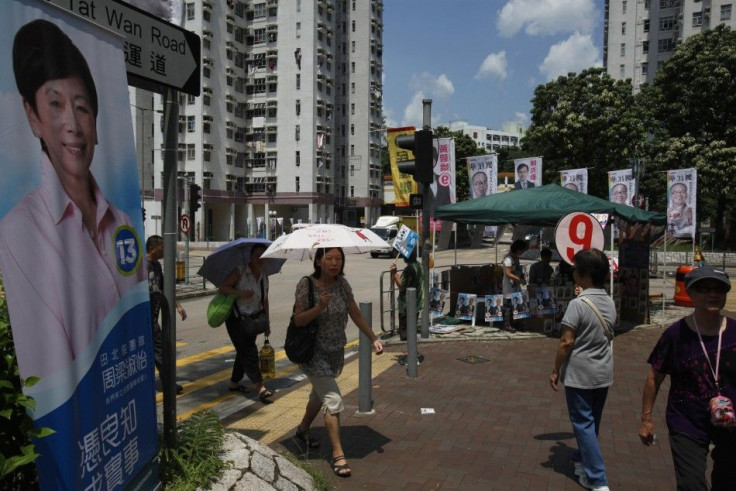In Hong Kong Election, Pro-Democracy Candidates Likely To Gain In Heavy Turnout

Hong Kong residents went to the ballot box Sunday to vote for members of the territory's legislative body, and early exit poll results indicate that pro-democracy, anti-Beijing candidates are likely to win the majority of popularly elected seats.
Economic issues like rising property prices and a growing income gap are of special concern in this election, as are allegations of government corruption.
But the most important issue remains Hong Kong's still-tenuous connection to mainland China, 15 years after the end of Brtish rule, with many Hong Kong residents seeking greater autonomy from the government in Beijing.
Until Saturday, this debate centered around a planned educational mandate that would have changed Hong Kong's public school curriculum to include new classes on Chinese culture and politics. Critics said the classes were meant to inspire blind patriotism and Communist Party loyalty, while supporters -- including Beijing-backed Hong Kong Chief Executive Leung Chun-ying -- argued that the reforms would implement general guidelines rather than strict requirements.
The conflict inspired tens of thousands of protesters to gather outside of Hong Kong government buildings over the past two weeks; several participated in hunger protests. On Saturday, Leung caved in and scrapped the plan to reform Hong Kong's education system. It was a clear victory for demonstrators, but deep divisions remain over Hong Kong's relationship to mainland China.
Hong Kong was a British colony until 1997, at which point it became a Special Administrative Region of China under a "one country, two systems" pledge. Hong Kong now operates with a fairly high degree of political autonomy, though Beijing controls its defense and diplomacy.
Sunday's vote is seen as a referendum on how close the region's ties to Beijing will be going forward.
Early exit polls indicate that voter engagement on Sunday was higher than it was during the last general election four years ago. The South China Morning Post reported that turnout exceeded 53 percent by the time the polls closed at 10:30 p.m. local time.
Exit polls also show that pro-democracy parties, which oppose a stronger connection with Beijing, are likely to win about three-fifths of the most broadly elected seats -- so-called 'superseats.'
For the first time this year, 40 of the 70 posts in the legislative council will be chosen by direct popular vote. The remaining 30 will be chosen by a group of business and politics experts. But those special electors have strong ties to Beijing, so it is highly unlikely that the pro-democracy candidates will garner enough votes to swing a majority.
They may, however, achieve the 24 seats they need in order to have veto power of constitutional amendments, which will greatly increase their power in the legislature.
Leung's position is safe; he began a five-year term in March of this year. Hong Kong's chief executive is still chosen by Beijing-allied electors, but that decision is slated be handed over to the public in 2017.
Official results of Sunday's election are expected on Monday.
© Copyright IBTimes 2024. All rights reserved.












